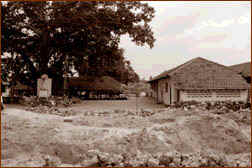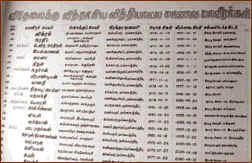 The
Mullaitivu
Maha
Vidyalam
reduced
to
rubble
during
the
war
has
been
rebuilt
Pix
by
Sudam
Gunasinghe
The
Mullaitivu
Maha
Vidyalam
reduced
to
rubble
during
the
war
has
been
rebuilt
Pix
by
Sudam
Gunasingheby Ranga Jayasuriya, December 12, 2004
Mullaitivu is rising from the ruins of intense fighting that lasted for over one and half decades and caused mass displacement.
The Mullaitivu Maha Vidyalam, the district's premier school reduced to rubble during the war has been rebuilt.
 The
Mullaitivu
Maha
Vidyalam
reduced
to
rubble
during
the
war
has
been
rebuilt
Pix
by
Sudam
Gunasinghe
The
Mullaitivu
Maha
Vidyalam
reduced
to
rubble
during
the
war
has
been
rebuilt
Pix
by
Sudam
Gunasinghe
The road to the coastal town via Paranthan junction has been newly tarred and four new bridges are being built by the Road Development Authority.
A majority of the district's population have resettled, but still Mullaitivu houses a large number of internally displaced people from other districts, mainly those who were uprooted by the High Security Zones in Jaffna.
When the Security Forces launched an operation to expand the Mullaitivu Military garrison in June 1990, the entire population fled the town, only to return in 1998, two years after the Mullaitivu Military Camp fell into Tiger hands.
"Only 14 people were left in the town after the army expanded the camp premises," says Rev. James Paththinathan, a priest at St. Peter's Church in the town.
Rev. Paththinathan sounds bitterly critical of the conduct of the government forces. "The Army had a habit of bombing civilian targets, when something went wrong in their operation against the LTTE," he says.
People fled to Pudikudirippu, some 20 km away from Mullaitivu. The Mullaitivu hospital, then a district hospital was deserted and the staff went to Pudikudirippu, where they provided treatment in makeshift huts adjacent to Pudikudirippu hospital premises.
With the military expanding its presence in the coastal town to counter the Sea Tiger threat, Mullaitivu became a garrison town. Army occupied most residential buildings. Mullaitivu Maha Vidyalam was abandoned.
 Some
forty
names
of
old
pupils
turned
LTTE
cadres
who
died
fighting
the
Security
Forces
are
written
on
a
wall
in
the
Mullaitivu
Maha
Vidyalam.
Some
forty
names
of
old
pupils
turned
LTTE
cadres
who
died
fighting
the
Security
Forces
are
written
on
a
wall
in
the
Mullaitivu
Maha
Vidyalam.
Both the hospital and the school suffered large-scale destruction in the subsequent clashes.
When the hospital authorities returned to Mullaitivu in 2001, they found the ruins of the buildings, which was once on par with the Vavuniya District Hospital.
The hospital is now run from a dilapidated administrative building and two residential wards and 76-year-old P. Krishnapillai, a Registered Medical Officer is the only doctor serving in the hospital. Another RMO shifts his work between Pudikudirippu and Mullaitivu hospitals. There is a single female nurse and a few attendants.
Krishnapillai lives in a cadjan roofed hut in the hospital premises.
Strolling in the ruins of the old hospital, he points to buildings and says: "There stood the surgery room. Here were two female wards.....".
The hospital is now reduced to two wards, one male and the other female and the OPD which provides treatment for 250 -280 patients on an average day.
Emergency cases are sent to Jaffna or Vavuniya depending on the circumstances. Krishnapillai says he is serving till a young doctor comes to take over, but sounds realistic when he says that no one is even considering the point as authorities have not provided them with proper accommodation.
Government Agent, Emelda Sukumar, a courageous woman tapping all avenues of funding says 100 million rupees have been allocated to a new building for the Mullaitivu hospital.
In 1998, eight years after it was shifted to Pudikudirippu, the Mullaitivu Maha Vidyalam was reopened in the bombed out buildings and makeshift camps.
Now it conducts classes from Year 6 to the Advanced Level in all streams for 1010 students. The damaged buildings were renovated with UNICEF assistance and a new building has been put up with government funding.
Sitting in his poorly equipped room, Principal Mariyapillai Anthony elaborates the achievements of his students. Last year, 69 out of 105 candidates passed the Ordinary Level examination.
Thirty two of the thirty three students who sat the Advanced Level examination passed the examenation. Five students received university admission, one in commerce stream and the rest in arts.
Thirty teachers now serve in the school. The Principal says he needs at least nine more teachers, mainly English teachers.
The school has only one English teacher now and Principal Anthony admits the English results are not good in the school.
From the LTTE's perspective, the Mullaitivu Maha Vidyalam has other reasons to be proud.
Written on a school wall are 40 names of old pupils turned LTTE cadres who died fighting the Security Forces.
"There are thirty more names to be written," Anthony says, adding that it is mandatory for every school in LTTE controlled areas to display a list of its old boys who gave their lives for Tamil Eelam. Anthony himself is a victim of the war.
When he returned home after eight years of displacement in Pudikudirippu, teaching students in cadjan huts, he found his home destroyed. He has now applied for compensation from the government. As it is a public service he is entitled to 150,000 rupees for his destroyed house.
According to Mullaitivu Government Agent, Emelda Sukumar, 22,907 families have been resettled since the ceasefire agreement, but there are still, 13,696 families of whom 9,827 are from Jaffna, who remain displaced in Mullaitivu, most living with their relations in the district. The GA admits that the dearth of staff has delayed the process of issuing compensation.
But, Sukumar's office issues dry rations for 20,800 families every month and 16,414 families have received 25,000 rupees each as an initial payment during their resettlement. The resettled families are entitled to compensations upto 150,000 rupees for their damaged houses.
Ms Sukumar is worried that over 3,000 war widows in the district do not receive any special assistance from the government. "Of course there is a shortage of funds. We are doing our best to get as much money as possible for resettlement work from the government as well as other donors".
She has got 78.5 million rupees passed for a new administrative building for the District Secretariat. For 12 years, her office operated from cadjan huts in Pudikudirippu, untill it was shifted back to Mullaitivu last year.
But she too is working with bare minimum facilities. She still does not have telephone facilities and electricity is provided from a generator. Her Assistant Government Agents are not yet provided with official transport. Cadre vacancies are yet to be filled. But, she sounds upbeat.
"We don't think the absence of telephone facilities is a big loss. We have opened an email account in Vavuniya Kachcheri office.
If there is any urgent letter, the officer there sends someone here with the letter. Otherwise, I visit, Vavuniya every week". Sukumar sounds optimistic. "We can make a difference in the lives of these people, if we work hard" .
Perhaps it is with optimism of this kind, that war-torn Mullaitivu should look for the future.
The Sunday Observer